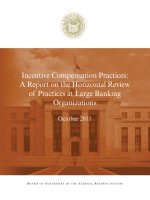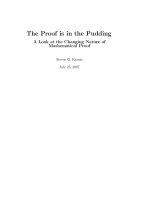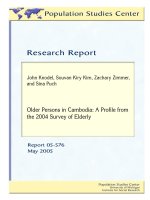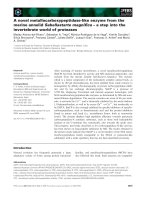A russian psyche the poetic mind of marina tsvetaeva
Bạn đang xem bản rút gọn của tài liệu. Xem và tải ngay bản đầy đủ của tài liệu tại đây (1.26 MB, 304 trang )
A Russian Psyche
A RUSSIAN PSYCHE
The Poetic Mind of Marina Tsvetaeva
Alyssa W. Dinega
THE UNIVERSITY OF WISCONSIN PRESS
The University of Wisconsin Press
1930 Monroe Street
Madison, Wisconsin 53711
www.wisc.edu/wisconsinpress/
3 Henrietta Street
London WC2E 8LU, England
Copyright © 2001
The Board of Regents of the University of Wisconsin System
All rights reserved
5
4
3
2
1
Printed in the United States of America
Library of Congress Cataloging-in-Publication Data
Dinega, Alyssa W.
A Russian psyche : the poetic mind of Marina =EBT=ECSvetaeva / Alyssa W. Dinega.
304 pp.
cm.
Includes bibliographical references and index.
ISBN 0-299-17330-5 (cloth: alk. paper)
ISBN 0-299-17334-8 (pbk.)
1. =EBT=ECSvetaeva, Marina, 1892–1941—Criticism and interpretation.
2. Cupid and Psyche (Tale) in literature. I. Title.
PG3476.T75 Z636
2001
891.71'42—dc21
2001001945
This book is made possible in part by a subsidy from the Institute
for Scholarship in the Liberal Arts, College of Arts and Letters,
University of Notre Dame.
For my own two tiny male muses,
Anton and Kirill
And for Evan, who is real at last
Can a unity (any whatsoever) really give a sum? A foreign essence. A different division
of atoms. A transcendent truth cannot be broken up into particles able merely to exist.
—Marina Tsvetaeva, letter to Boris Pasternak, 10 July 1926
In another human being only the forehead and some of the chest cavity belong to me.
I relinquish the heart easily, I won’t relinquish the chest. I need an echo chamber. The
heart rings hollow.
—Marina Tsvetaeva, letter to Rainer Maria Rilke, 14 August 1926
I fear me this—is Loneliness—
The Maker of the soul
—Emily Dickinson, ‘‘The Loneliness One dare not sound . . .’’
Contents
Preface
Acknowledgments
xi
xv
Introduction: Walking the Poetic Tightrope
1. Battling Blok and Akhmatova: In Pursuit of a Muse
2. Conjuring Pasternak: A Divided Psyche
3. Losing Rilke: The Dark Lure of Mra
4. Ruing Young Orphans: The End of the Line
3
35
90
129
177
Postscript
226
Notes
Index
233
277
ix
Preface
When I first encountered Marina Tsvetaeva a decade ago, I was a new college
graduate studying for a semester in Soviet Moscow, entirely unsure what I
wanted to ‘‘become’’ once I departed that magical, compelling never-never land.
I remember my meeting with Tsvetaeva clearly: sitting in a friend’s dingy dormitory room at Moscow State University, I looked down at the open book he
proffered. No matter that the room was drenched in chilly winter darkness,
lit only by a feeble lamp; no matter that my Russian was still halting, or that
Cyrillic characters clustered densely on a page still had a tendency to jump and
dance before my eyes instead of resolving themselves smoothly into meaningful
words and thoughts. Tsvetaeva’s poem ‘‘Gypsy passion for parting’’ [‘‘Tsyganskaia strast' razluki’’] went unfalteringly straight to my heart with its boldness,
its courage, its exactitude, and its music. Sparks flew; a blinding stroke of lightning seemed to illuminate that dim mousehole of a room; and, to borrow an
image from Tsvetaeva herself (who had borrowed it from Maiakovskii), a fire
began to smolder in my soul.
Or perhaps it was not quite like this; perhaps it is this way only in memory.
In any case, Tsvetaeva has been with me from that point on like an incurable
fever. The first poem of hers that I read that evening proved to be oddly fateful:
Цыганская страсть разлуки!
Чуть встретишь—уж рвешься прочь!
Я лоб уронила в руки,
И думаю, глядя в ночь:
Никто, в наших письмах роясь,
Не понял до глубины,
Как мы вероломны, то есть—
Как сами себе верны.
[Gypsy passion for parting! You’ve just met—already you tear
yourself away! I cup my forehead in my hands and think, gazing
into the night: No one who riffled through our letters could understand to the core how treacherous we are, meaning—how faithful
to ourselves.]
xi
xii
Preface
In this poem of 1915 is contained, as it were, the kernel of my book. Here is the
essence of Tsvetaeva’s poetic myth, which, though it modulates over time, never
loses its basic features: namely, her oxymoronic ‘‘passion for parting,’’ and the
epistolary renunciation of love that passion occasions, through which the mysterious self of the poet comes into being like a phoenix rising from the ash of
incinerated dreams. These mythopoetic patterns, as I will argue, form the basis
for Tsvetaeva’s creative imagination throughout her life. In ‘‘Gypsy passion,’’
too, is the quintessence of Tsvetaeva’s craft: her exquisitely wrought stanzaic
forms, telegraphic style, unorthodox rhymes, and, permeating it all, her powerfully syncopated rhythms. Such craft balances out her paradoxical passion and
belies interpretations of Tsvetaeva as an undisciplined Romantic. She herself
claimed the eighteenth-century poet Derzhavin as one of her most important
influences; indeed, there is a classical rigor to Tsvetaeva’s poetic forms, even as
her myth making is informed by a remarkably complex and consistent—albeit
idiosyncratic—rigor of thought.
This book is an investigation into these rigorous patterns of thought and form
that both held Tsvetaeva in their thrall and liberated her creative imagination.
Truly, Tsvetaeva’s poetic activity—which, especially during the years of her
emigration (1922–39), she experienced as a release from the drudgery of housework and daily life—appears strangely like a kind of spiritual servitude. Her
work ethic is awesome and inspiring. Living at times in the most appalling conditions of poverty, with two small children and an ailing and unreliable husband to care for, she nevertheless rose before dawn each day to write for several
hours before the rest of her household began stirring. In this way, she managed to churn out with astonishing rapidity masterpiece after poetic masterpiece
through the years. Counterintuitive as it seems, Tsvetaeva thrived in conditions
of adversity. Her temperament was such that she enjoyed the challenge; as she
herself once wrote, her constitution was one of ‘‘monstrous endurance’’ (6:153).1
This phrase is fantastically apt as an expression of Tsvetaeva’s unique blend of
courage and chutzpah. Just as the key to her poetic genesis is the coexistence
of two contradictory stimuli—passion and renunciation—so, too, the key to her
poetic energy is this seemingly unrealizable confluence of ferocity and forbearance.
In writing this book, I have often envied Tsvetaeva’s remarkable creative
vitality. The image of her stationed at her desk—elbows as though implanted
in the wooden surface, forehead in hands, fingers drumming, pen scratching,
her total immersion in the music and patterns of her words—has often been in
my mind as I have struggled at times to sustain a state of concentration and inspiration resembling Tsvetaeva’s own tenacity of artistic purpose. The fact is
that such a feat is impossible; Tsvetaeva’s poetic generosity, her full absorption in her poetic world no matter what events were transpiring in the world
around her, is inimitable. Nor do I pretend to exhaust the richness of Tsvetaeva’s
Preface
xiii
poetic thought which, like the product of all truly brilliant minds, is inexhaustible. Nevertheless, I hope I succeed in this book in illuminating the contours
of Tsvetaeva’s complex—and, I will admit it, sometimes dauntingly difficult—
poetry in new ways, independent of preconceived notions or theories. If Tsvetaeva comes alive again in all her perplexing paradoxicality in the pages of this
book, then my purpose is accomplished.
Acknowledgments
This is an exciting time in Tsvetaeva scholarship; nearly 110 years since the
poet’s birth, the study of her works, long delayed by official disfavor and prejudices of various kinds, is belatedly coming of age at last. I am thrilled and
honored that my own book is a participant in this explosion of serious Tsvetaeva
scholarship; at the same time, my study is deeply indebted to the perceptive and
provocative insights into Tsvetaeva’s poetry on the part of earlier scholars too
numerous to name.
This book has profited from the financial support of a number of different
organizations. My research was assisted by a grant from the Eurasia Program
of the Social Science Research Council with funds provided by the State Department under the Program for Research and Training on Eastern Europe and
the Independent States of the Former Soviet Union (Title VIII), as well as by
a Foreign Language and Area Studies Graduate Fellowship and a Detling Fellowship from the University of Wisconsin–Madison during earlier stages of the
project. I am also grateful to the Institute for Scholarship in the Liberal Arts
at the University of Notre Dame for a generous subvention grant to the University of Wisconsin Press, which helped to underwrite the cost of this book’s
publication.
My literature professors during my undergraduate years at Brandeis University helped to shape my thinking about writing and inspired me to follow in their
academic footsteps; Allen Grossman, Karen Klein, Alan Levitan, Paul Morrison, and Robert Szulkin each left a particularly vivid imprint on my mind.
My tireless college Russian teacher, Inna Broude, first introduced me to the
beauties of Russian as a poetic language. What knowledge I have of Russian literature is thanks, first and foremost, to the generously shared expertise of my
graduate professors at the University of Wisconsin–Madison; their excellence
has been an inspiration to me, and their encouragement of my work has been
a stimulus over the years. In particular, I am thankful to the members of my
dissertation committee—David Bethea, Yuri Shcheglov, Judith Kornblatt, Gary
Rosenshield, and Cyrena Pondrom—whose thoughtful comments have guided
me during the process of transforming my dissertation into this book.
xv
xvi
Acknowledgments
In this book, all translations from the original German or Russian are my own
unless noted otherwise. Citations from prose are given only in English translation (with occasional interpolations of fragments from the original text given in
brackets whenever necessary); citations from poetry are given both in the original language and with accompanying English translation. I make no attempt to
reproduce the poetic qualities of the original (rhythm, rhyme, soundplay, etc.);
rather, my translations are straight prose renderings of the texts’ meanings on
the most fundamental level and, as such, are best used as a comprehension aid
in tandem with a careful reading of the original. Although I take full responsibility for any inaccuracies in my translations, their quality has been enhanced
by two careful proofreaders: Yuri Shcheglov read the translations from Russian
of Tsvetaeva’s poetry, while Jan Lüder Hagens read the translations from German of Tsvetaeva’s and Rilke’s writings cited in chapter 3. I was fortunate to
have the benefit of these scholars’ meticulous attention to detail and nuance.
A number of people have read and commented helpfully on parts of my manuscript or, more generally, on my approach to Tsvetaeva at various stages; these
include David Bethea, Clare Cavanagh, Catherine Ciepiela, Caryl Emerson,
Sibelan Forrester, Olga Peters Hasty, Stephanie Sandler, David Sloane, Alexandra Smith, Susan St.Ville, and David Woodruff. In particular, Stephanie Sandler
and Caryl Emerson, manuscript readers for the University of Wisconsin Press,
far exceeded the call of duty and responded eloquently to my manuscript with
pages and pages of clear-sighted reaction, queries, and suggestions for revision.
It is largely thanks to their efforts that I have managed during the past months
to tug and coax my unkempt dissertation into what I hope is a fully groomed
and polished book. I also thank Catherine Ciepiela for sharing with me a chapter of her work in progress, which helped me greatly in formulating my own
discussion of Tsvetaeva’s ‘‘On a Red Steed’’ in chapter 1. Throughout the final
stages of work on this manuscript, my colleagues at the University of Notre
Dame have provided companionship and an environment conducive to concentrated work and writing. My student aide, Andrea Shatzel, has assisted with
last-minute editing tasks.
This study could not have been written without the continuing wise counsel,
moral support, and unstinting scholarly generosity of David Bethea, my Ph.D.
dissertation advisor and former interim director of the University of Wisconsin
Press, whose rare blend of intellectual probity and poetic enthusiasm has been
a beacon to me from the earliest stages of this project. I thank him with all my
heart for his passion for literature, his ability to energize and provoke me, his
good humor under fire, and his faith in me during the darkest times.
Finally, I am grateful to my family for helping me to become the person that I
am today. My parents’ confidence in me throughout the years has allowed me to
persevere in this and other pursuits. My twin sons are the guiding light behind
Acknowledgments
xvii
this book; in their four short years, they have taught me more than I could ever
have anticipated about self-discipline, commitment, and unconditional love.
My beloved husband is for me a source of ceaseless wonder, warmth, and inspiration; he is, too, the facilitator par excellence who has made this adventure
in life and poetry possible.
A Russian Psyche
Introduction
Walking the Poetic Tightrope
Что, голубчик, дрожат поджилки?
Все как надо: канат—носилки.
Разлетается в ладан сизый
Материнская антреприза.
[What, my little dove, do your knees tremble? Everything is as
it should be: the tightrope—the stretcher. The maternal enterprise scatters into the gray mist of incense.]
—‘‘Ni krovinki v tebe zdorovoi . . .’’ (1919)
Там, на тугом канате,
Между картонных скал,
Ты ль это как лунатик
Приступом небо брал? . . .
Помню сухой и жуткий
Смех—из последних жил!
Только тогда—как будто—
Юбочку ты носил.
[There, on the taut tightrope, between the cardboard cliffs, was
it you who like a sleepwalker took the sky by storm? . . . I remember dry and terrible laughter—on the brink of exhaustion!
Only then—it was as if—you wore a skirt.]
—‘‘Tam, na tugom kanate . . .’’ (1920)
Если б Орфей не сошел в Аид
Сам, а послал бы голос
Свой . . .
Эвридика бы по нему
Как по канату вышла . . .
[If Orpheus had not gone down to Hades himself, but had sent
his own voice . . . Eurydice would have walked out along it as
along a tightrope . . .]
—‘‘Est' schastlivtsy i schastlivitsy . . .’’ (1934)
3
4
Introduction
What does it mean for a woman to be a great poet, an inspired poet, a tragic poet,
a poet of genius? This is a deceptively simple query, and one whose conceivable
multifarious answers go far beyond issues of gender to have implications for
language, imagery, form, genre, aesthetics, mythopoetics, metaphysics, ethics,
and so on. Indeed, feminist criticism has often found the category of ‘‘genius’’
to be inherently problematic, insofar as it derives from a Romantic mythology
of the (implicitly) male poet and therefore prevents the inclusion of women in
the literary canon.1 Clearly, what is at issue is not the possibility in itself that a
woman writer can exhibit brilliance; rather, the inspirational myths that attach
to the male genius, visited by his female muse or what Robert Graves has called
the ‘‘White Goddess,’’ simply do not allow for the instance when ‘‘he’’ is a girl.2
Yet the apparent illogicality of the question of female genius has not prevented women writers from continuing to ask it, whether implicitly or explicitly,
both in their poetry and in the enigmatic biographical ‘‘texts’’ of their lives. In
the Russian tradition, I believe it is Marina Tsvetaeva who poses this question
most daringly and compellingly. For, in contrast to the more docile Akhmatova—who is largely complicit in poetic voice and projected self-image with the
cultural code of the ‘‘poetess,’’ 3 despite the unusual strength of her talent and
tragedy of her life—Tsvetaeva leaves the confines of the persona of poetess far
behind. Instead, she devotes her entire life and creative opus to a ceaseless hunt
for some viable resolution to the riddle of how a woman can attain the status of
pure, ungendered, human greatness.
Gender is for Tsvetaeva a fundamentally negative concept. Much as she celebrates women’s particular strengths and abilities, at base femininity for her is
simply incommensurate with poetry. There is an axiomatic disjunction between
the two essences—feminine and poetic—that define her identity that she seems
to have felt intuitively from the earliest age. It is precisely her gender that forges
a wedge between the demands of poetry and the demands of life. Her gender is
the prime factor in the equation of her being, the irreducible ‘‘x’’ that ordains
that, however life and poetry are divided up, their domains can never coincide.4
Yet, at the same time, she can never bring herself to embrace either to the exclusion of the other—for life (even frustrated attempts at ‘‘life’’) is the fodder
of poetry; whereas without poetry, life would be suffocating.
This powerful split forms the basis of my present inquiry. My project is to
trace Tsvetaeva’s various solutions to this feminine poetic impasse. The reasons
(political, sociological, cultural, psychological, literary-historical, biological,
anatomical) for the split are not my primary interest here; I do not intend to
argue it into or out of existence—it is simply there, informing everything Tsvetaeva ever thought, felt, or wrote. I ask why only in poetic terms, for this is the
aspect of the question that interested Tsvetaeva. It might be said that all of her
explorations of the gender question in her work are simultaneous attempts to
qualify the ‘‘why’’ of this split perspective on reality and to try to provide a set
Walking the Poetic Tightrope
5
of strategies to cope with it. That her dilemma is primarily a poetic rather than
a social one can be seen from her tendency to work and rework a given aspect
of the problem in a whole series or ‘‘cluster’’ of poems, which may or may not
be grouped into a formal poetic cycle or collection. This creative method motivates my own interpretive approach: I analyze groups of texts centered on a
common theme or problem and illustrate the progression of her thought as she
broaches more or less satisfactory solutions in each successive piece of writing.
Tsvetaeva believes fully in a spiritual realm—accessible through the transcendence of artistic endeavor—in which gender difference disappears entirely
along with the body itself. Furthermore, she adamantly rejects the essentialist view that women are fundamentally excluded from the realm of meaningful
human discourse, including poetic craft and tradition. Yet, conversely, she never
forgets that the material of artistic production is gleaned from the experiences
of real life, in which sexual (physiological) and gender (psychosocial) differences are an indubitable reality. Thus, in the immediate, physical world, real
women, herself included, must struggle to overcome the internalized limitations that threaten to deny them access to the transcendent, human beyond. We
find that her divided loyalties lead, in the extreme case, to an irreparable disjunction between the sphere of human interaction on the one hand (in which the
‘‘default position’’ must be some form of morality or ethics) and the fantastical
world of poetry on the other hand (in which the analogous ‘‘default position’’
tends toward the aesthetic dominant and in which the dangerous possibility of
making words mean more than one thing at once, or even making them mean
their opposite, is on the ascendant).
Tsvetaeva’s stance on the gender question thus necessitates her execution of
a perilous dance over the abyss. The recurrent motif in her work of the tightrope—always explicitly in connection with the female poetic predicament—
vividly illustrates this impossibly acrobatic poetic posture. Her life is a daring,
sometimes foolhardy and sometimes awe-inspiring walk across the tightrope of
her poetry, a metaphysical balancing act with potentially grave costs and consequences. She treads a fine line in her verse between transgression and transcendence, between a feminine subversion and renovation of human and poetic
norms and the ungendered attainment of the sublime that is, in the final analysis,
indistinguishable from nonbeing. Indeed, she stakes out in her poetry an exhilarating and disturbing marginal position that has elicited no dearth of critical
reaction equaling in the degree of its vehemence (whether laudatory or condemnatory) anything that she herself ever wrote.5
In my view, Tsvetaeva’s writing has been received with such palpable enthusiasm or disapprobation precisely because it brings into relief the underlying
assumptions of the literary tradition and, by extrapolation, of all human norms; it
‘‘poses the question of the partiality, that is, the sexualization of all knowledges.
It entails an acknowledgment of the sexually particular positions from which
6
Introduction
knowledges emanate and by which they are interpreted and used.’’ 6 However,
for all Tsvetaeva’s recent modishness in high theoretical circles,7 this potent aspect of her poetics has largely gone unrecognized, overshadowed as it is by the
allure of her dramatic and provocative biography.
After Tsvetaeva’s death in 1941, her works were not published at all in the
Soviet Union for fifteen years, and her poetic voice was all but forgotten, both
in her own country and abroad. In the wake of her comparatively recent rediscovery in the 1960s and 1970s, it was natural that the first critical studies to
emerge were devoted primarily to an establishment of the biographical and literary facts.8 Yet the fascination with her life and personality has not subsided with
time; rather, even in studies ostensibly devoted to her poetry, Tsvetaeva continues to be viewed primarily as a woman, and only secondarily as a writer. Certain preconceived notions about women’s writing in general have often shaped
critical discussions of her work, including the idea that her poetry ‘‘inscribes’’
images of the female body; the interpretation of her writing as a poetic journal,
an unmediated expression of her true self and experiences; and the focus on her
suicide as the unavoidable consequence of male sociolinguistic norms.9
In my own inquiry, on the contrary, I view Tsvetaeva consistently as a writer
who is a woman, rather than as a woman who transparently writes her female experience.10 Rather than imposing any external criteria on the study of her texts,
I set out to examine the intrinsic significance of her gender within the world of
her poetry. I investigate the role that gender plays in her poetic grappling with
the fundamental questions of human existence, as well as in her continual testing of poetry’s foundations, possibilities, and limitations. Thus, although in this
book my central concern is the way in which Tsvetaeva’s female gender ‘‘leaves
its traces in literary texts and on literary history,’’ 11 my primary object is neither
politics nor the formation of or adherence to a particular theoretical conviction.
Instead, I am interested first and foremost in understanding the specifics of the
poetic text that is not only female, but human.
Tsvetaeva chafed at being treated as a diminutively female poet [zhenskii
poet], most notoriously in her account of an ‘‘Evening of Poetesses’’ organized
by fellow poet Valerii Briusov; in her memoir of the evening, she writes: ‘‘There
is no women’s question in art: there are women’s answers to the human question’’
(4:38). Clearly, the human body, and the female body in particular, provides a
rich source of poetic metaphor in Tsvetaeva’s work. Yet her body serves her as
a writer, rather than the other way around; indeed, her poetry causes her body
to metamorphose into a musical instrument: ‘‘The heart: more a musical organ
than an anatomical one’’ [Serdtse: skoree orgán, chem órgan] (4:476).12 Truly,
for Tsvetaeva poetic language is ‘‘inherently fictive.’’ 13 Through the transformative action of such poetic language, she strives to neutralize her female gender,
as it were—and it is paradoxically for the purpose of this neutralization that she
keeps her gender constantly in view.
Here, then, is the central thesis of this study, which explores how gender is









